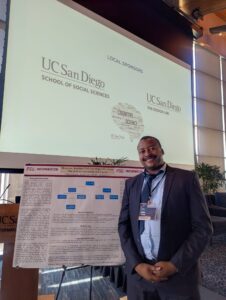School of Information graduate student Odin Moja presented his research, “Synthetic Data and Object Detection: The Perfect is the Enemy of the Good,” at the 2025 Association for Computing Machinery (ACM) Collective Intelligence Conference in San Diego, California, on August 4, 2025. Hosted by one of the leading computing associations, the ACM conference prioritizes the practical applications of technology research and collaborative problem-solving.
 “Of course, there is the focus on building a better algorithm or finding a more precise way to produce circuitry, but there’s not much focus on the practical, everyday societal applications of some of these computing discoveries. The Collective Intelligence Conference has a stronger focus on that,” Moja said.
“Of course, there is the focus on building a better algorithm or finding a more precise way to produce circuitry, but there’s not much focus on the practical, everyday societal applications of some of these computing discoveries. The Collective Intelligence Conference has a stronger focus on that,” Moja said.
Moja’s presentation highlighted applications of synthetic data generated by AI to optimize existing real data and promote more accessible information. Moja emphasized that this research may advance areas such as medicine, environmental conservation efforts, population data collection, and even credit card fraud detection software.
“Synthetic data helps us overcome information scarcity by giving us the right quantity and right quality of information, and helps preserve privacy for people involved,” Moja said.
At the conference, Moja stressed how broad the concept of collective intelligence was and how it blurred the lines between so many disciplines.
 “I was exposed to projects that blended anthropology with data science, and projects that blended large language models with social studies. It was fascinating stuff,” Moja said.
“I was exposed to projects that blended anthropology with data science, and projects that blended large language models with social studies. It was fascinating stuff,” Moja said.
Reflecting on his presentation, Moja hopes his audience learned about the growing importance of synthetic data and will want to contribute more efforts toward the generation, curation, and pragmatic uses of synthetic data.
Once he completes his graduate dissertation, Moja plans to work further in data curation to help fine-tune the best practices and specific uses of synthetic data. He also emphasized how thankful he is to everyone in the iSchool for helping him achieve his success thus far, specifically Drs. Lori Mon, Marcia Mardis, Charles Hinnant, Christy Chatmon, and Jonathan Adams.
“We don’t need perfect data. We need good enough data for what you want to do,” Moja said.

